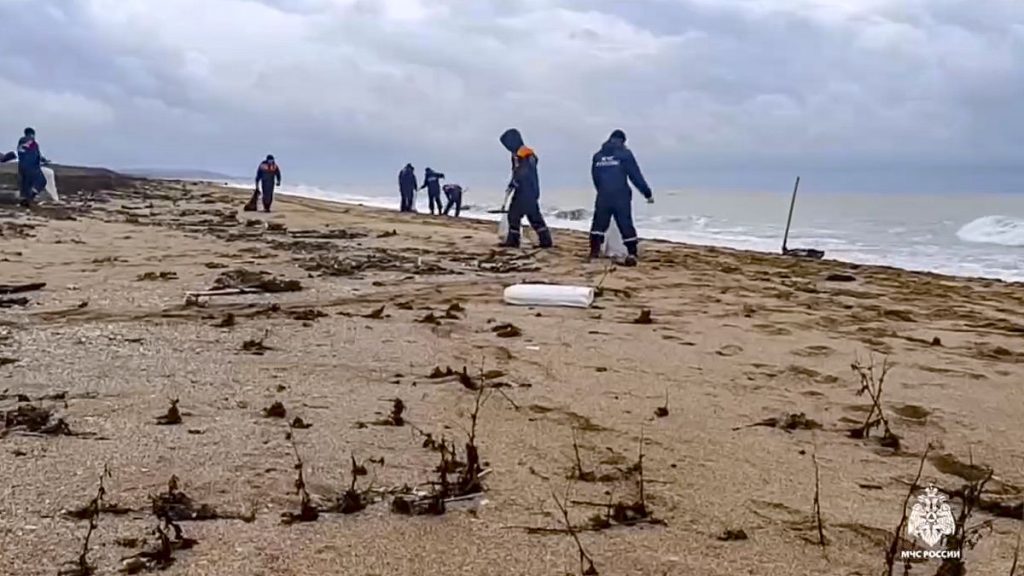Paragraph 1: The Spill and Initial Response
An oil spill incident in the Kerch Strait, a vital waterway connecting the Sea of Azov to the Black Sea, has triggered environmental alarms and emergency responses in the region. Two tankers suffered damage nearly three weeks prior to the declaration of emergency, resulting in the release of fuel oil into the strait. The oil subsequently drifted approximately 250 kilometers to the southwest, reaching the shores of Sevastopol, the largest city on the Crimean Peninsula. This incident prompted Sevastopol’s governor, Mikhail Razvozhaev, to declare a regional emergency. Initial reports indicated oil contamination on four beaches within the Sevastopol region. Razvozhaev assured the public that the contamination was not widespread and that prompt action had been taken to address the issue, involving local authorities and volunteers working collaboratively to eliminate the oil.
Paragraph 2: Escalation and Regional Impact
The oil spill’s impact extended beyond Sevastopol, prompting a region-wide emergency declaration in Russia’s southern Krasnodar region the week prior. This action underscored the escalating nature of the crisis as fuel oil continued to wash ashore ten days after the initial tanker incident. Krasnodar’s governor, Veniamin Kondratyev, provided updates on the extensive cleanup efforts underway, reporting the involvement of nearly 7,000 personnel. The scale of the cleanup operation was evident in the removal of over 96,000 tons of contaminated sand and soil from the affected shoreline. The initial estimate by the Russian ministry, issued shortly after the incident, suggested that up to 200,000 tons of material might be contaminated with mazut, a heavy, low-quality oil product. This significant volume underscored the magnitude of the environmental challenge.
Paragraph 3: Presidential Concern and Geopolitical Context
The severity of the oil spill drew the attention of Russian President Vladimir Putin, who characterized the incident as an "ecological disaster." The Kerch Strait holds strategic importance as a major global shipping route, facilitating maritime traffic between the Sea of Azov and the Black Sea. Beyond its economic significance, the strait has become a focal point of geopolitical tension between Russia and Ukraine since Russia’s annexation of Crimea in 2014. This annexation heightened the sensitivity surrounding any incidents occurring within the strait, adding a layer of political complexity to the environmental crisis.
Paragraph 4: Legal Disputes and International Implications
The ongoing dispute over Crimea’s status has led to legal proceedings between Russia and Ukraine. In 2016, Ukraine initiated action against Russia in the Permanent Court of Arbitration, accusing Moscow of illegally seizing control of the Kerch Strait area. This legal challenge highlights the contested nature of the waterway and the broader implications of any incidents occurring within its boundaries. The oil spill has further inflamed tensions and provided Ukraine with additional grounds to criticize Russia’s actions in the region. The international community is closely monitoring the situation due to the potential for further escalation and the broader implications for regional stability.
Paragraph 5: Ukrainian Response and Calls for Sanctions
Mykhailo Podolyak, an adviser to Ukrainian President Volodymyr Zelenskyy, labeled the oil spill a "large-scale environmental disaster," adding to the international condemnation of the incident. Podolyak’s statement highlighted Ukraine’s concern about the environmental repercussions and its broader geopolitical implications. He further called for additional sanctions against Russian tankers, seeking to hold Russia accountable for the incident and deter future environmental negligence. This call for sanctions reflects Ukraine’s strategy of leveraging international pressure to address the ongoing tensions with Russia and underscores the intertwining of environmental concerns with broader political objectives.
Paragraph 6: Environmental and Economic Consequences
The oil spill poses significant environmental risks to the delicate ecosystem of the Kerch Strait and the surrounding Black Sea region. The heavy mazut oil can have devastating effects on marine life, coastal habitats, and water quality. The long-term consequences of the spill are still unfolding, and ongoing monitoring is essential to assess the full extent of the damage. In addition to the environmental impact, the incident carries economic consequences, affecting fishing industries, tourism, and potentially disrupting shipping activities in the vital waterway. The cleanup efforts are costly and time-consuming, placing a significant burden on the affected regions. The broader economic ramifications of the spill highlight the interconnectedness of environmental and economic well-being in the region.














